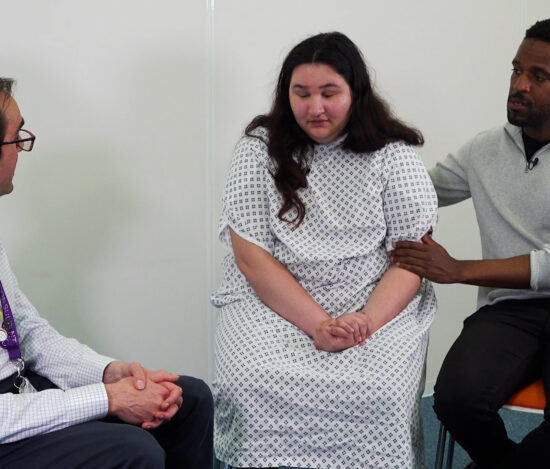Enhancing Workplace Wellbeing: The Power of Simulated Conversations
Stress, anxiety, and depression are not merely individual struggles; they have a profound ripple effect within workplaces, casting a long shadow over both employees’ well-being and organisational dynamics. These issues are alarmingly widespread, affecting approximately one-fifth of the working-age population (Goetzel, et al., 2018). The implications of this extend far beyond personal suffering, as they can significantly impact organizational productivity and staff retention. It has become increasingly evident that conversations between colleagues play a pivotal role in addressing these complex workplace challenges.
The potential of these conversations should not be underestimated. Engaging in meaningful dialogues among coworkers has been proven to have a positive impact on the work environment. Such exchanges can serve as powerful tools to mitigate stress, elevate job satisfaction, boost productivity, nurture stronger interpersonal relationships, and cultivate a more positive and conducive workplace atmosphere (Department of Health and Social Care, 2021). While larger organisations have initiated numerous policy-driven well-being programmes, there exists a collective yearning among colleagues for something more tangible and impactful—an opportunity to actively practice and refine their conversational skills, particularly in the context of addressing crucial workplace matters (Suter, et al., 2022)


SimComm: Communication for Non-healthcare Workplaces
In response to this ever-growing need, SimComm embarked on a journey to develop a remote live workshop featuring authentic simulated scenarios. These workshops were meticulously crafted to resonate with a variety of audiences, transcending cultural boundaries. The goal was to empower staff members to feel not only comfortable but also confident in initiating and engaging in proactive conversations with their colleagues daily. This initiative emerges as a testament to the recognition that effective communication lies at the heart of fostering workplace well-being and that hands-on practice in these conversations can be a transformative force for individuals and organisations alike.
From 2021 to 2022, SimComm invested 120 hours in developing a live module tailored for managers in non-healthcare environments. This module was preceded by three online eLearning modules, each focused on “being aware, being proactive, and being responsive.”
After subjecting the program to eight pilot runs, we meticulously analysed feedback from participating managers, facilitators, and actors to refine both content and delivery.
In 2023, we launched an additional 24 workshops, utilizing the fine-tuned content and delivery structure. This phase involves a staggering 144 actors, 24 facilitators, and 24 simulation advisers. Our participants, global managers, are grouped by geographical regions, with module timings thoughtfully adjusted to accommodate different time zones.
In total, 192 participants engage in small groups of eight, with a 90-minute follow-up session scheduled a month later to delve deeper into personal areas of focus.


Nurturing Safe Spaces and Focusing on Growth
Creating a safe and supportive space has been the guiding principle of our journey. As participants delved into the programmes, they found themselves immersed in a series of six meticulously crafted scenarios. Each of these scenarios was designed to address critical issues that often lurk beneath the surface of the workplace: loneliness, disillusionment, overwork, depression, crisis, and acute anxiety.
In this immersive environment, participants could comfortably challenge themselves to dig deeper. The focus was not just on addressing these complex issues but also on equipping individuals with practical skills and insights to navigate them effectively. Through these scenarios, participants embarked on a journey of self-discovery, discovering the power of sensitivity, honing their observational skills, and learning to align their values with those of their colleagues. They realised the profound impact of dedicating more quality time to their coworkers and the necessity of scheduling self-care routines to maintain their well-being.
Yet, as with any transformative journey, challenges emerged. Ensuring equitable discussion and active participation for all, regardless of their background or role, required diligent timekeeping and facilitator support. Additionally, the seamless integration of the six actors into the program was no small feat. However, the lessons learned, and insights gained from our pilot experiences played a pivotal role in overcoming these obstacles.
The comprehensive programmes hold immense potential to elevate support, retention, and overall well-being within this non-healthcare organisation. Its universal applicability is evident through its global reach, catering to five diverse regions. This adaptability underscores its relevance and effectiveness across a wide array of workplaces, regardless of their unique challenges and cultural nuances.
As we reflect on the success of these programmes, we see their potential extending far beyond the boundaries of our organisation. It stands as a testament to the transformative power of simulated conversations in shaping healthier, more supportive, and ultimately more successful work environments. By placing genuine conversations at the heart of workplace culture, we’ve taken a significant step towards building a brighter and more compassionate future.
References
- Goetzel RZ, Roemer EC, Holingue C, Fallin MD, McCleary K, Eaton W, et al. Mental Health in the Workplace. Journal of Occupational and Environmental Medicine [Internet]. 2018 Apr;60(4):322–30. Available from: https://www.ncbi.nlm.nih.gov/pmc/articles/PMC5891372/#__ffn_sectitle
- Department of Health and Social Care, Cabinet office. COVID-19 mental health and wellbeing recovery action plan [Internet]. GOV.UK. 2021. Available from: https://www.gov.uk/government/publications/covid-19-mental-health-and-wellbeing-recovery-action-plan
- Suter J, Irvine A, Howorth C. Juggling on a tightrope: Experiences of small and micro business managers responding to employees with mental health difficulties. International Small Business Journal: Researching Entrepreneurship. 2022 Apr 23;026624262210842.






